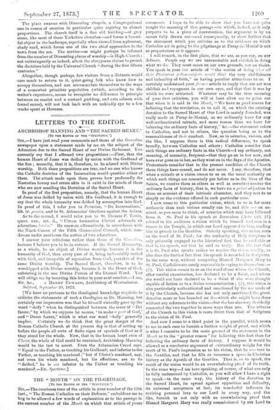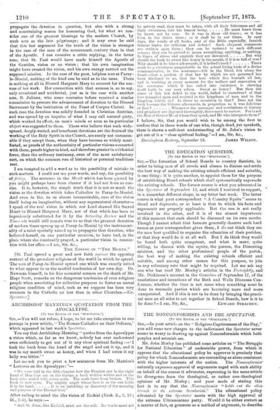THE " MONTH " ON THE PILGRIMAGE. [To THE EDITOR
OF THB " SPECTATOR."] "But,—The courteous tone of the article in your number of the 13th inst., " The Roman Catholics on their Defence," emboldens me to 'beg to be allowed a few words of explanation as to the passage in the current number of the Month on which that article of yours comments. I hope to be able to show that you Lave not quite caught the meaning of that passage—in which, indeed, as it only purports to be a piece of conversation, the argument is by no means fully drawn out—aud consequently, to show farther that the statement which you criticise as to the evidence on which Catholics act in going to the pilgrimage at Paray-le-Monial is not so preposterous as It appears.
I will remark, in the first place, that we are, as you say, on our defence. People say we are unreasonable and childish in doing what we do. They must mean on our own grounds, not on theirs. You speak in your last article of " the notion of doing telt tt all their Prohrstant fellow-subjects would think• the very childishness and imbecility of faith," as having peculiar attractions to us. I certainly understood your former article to imply that our act was childish and repugnant in our own eyes, and that that it was by which we were attracted. Whatever may be the true meaning of your first criticism, you will at least allow me to point out that when it is said in the Month, " We have as good reason for believing that the revelation, so to call it, on which the existing devotion to the Sacred Heart of Our Lord is mainly founded, was really made at Paray-le-Monial, as we ordinarily have for any well-authenticated miracle, and more reason than we have for believing the ordinary facts of history," &c.—the statement refers to Catholics, and not to others, the question being as to the reasonableness of their conduct. Now, as to miracles, visions, and the like, I suppose there is this radical difference, to speak broadly, between Catholics and others ; Catholics consider that such things are ordinary facts in the Church—I say ordinary, not meaning, of necessity, frequent—that they go on in her now, and have ever gone on in her, as they went on in the days of the Apostles. Protestants consider that in the present condition of the Church these things have ceased, and do not occur. I say, therefore, that when a miracle or a vision comes to us on the usual authority on which such things are commonly put before us in the lives of the Saints, we receive them as others as well as ourselves receive the ordinary facts of history, that is, we have no a priori objection to them on account of their intrinsic character, and they rest to us simply on the evidence offered in each particular case.
I now come to this particular vision, which to us is far more authentic than such visions usually can be, and this sot on ac- count, as you seem to think, of miracles which may have followed from it. St. Paul in his speech at Jerusalem (Acts xxii. 21) related to his audience a vision which tie himself hind seen in a trance in the Temple, in which our Lord appeared to him, sending him to preach to the Gentiles. Strictly speaking, this vision rests on the word of St. Paul ; for the authority of Holy Scripture is only primarily engaged to the historical fact that he said this or that in his speech, not that he said so truly. But the fact that it is St. Paul who speaks makes us receive the vision readily, as also does the further fact that his speech is recorded in Scripture. In the same way, without comparing Blessed Margaret Mary to St. Paul, Catholics are surely reasonable in saying to themselves : (1). This vision comes to us on the word of one whom the Church, after careful examination, has declared to be a Saint, and whom she would not have declared to be a Saint if she were thought capable of fiction as to a divine communication ; (2), this vision is also particularly authenticated and sanctioned by the use made of it by the Church, because she has not only sanctioned the great devotion more or less founded on it—which she might have done without any reference to the vision—but she has also very decidedly connected the two together in more ways than one. The witness of the Church to this vision is more direct than that of Scripture to the vision of St. Paul.
And now I come to a third point in the parallel, which seems to me in each case to furnish a further weight of proof, and which is what I conceive to be the main ground of the statement in the Month as to the "greater reason" for believing this fact than for believing the ordinary facts of history. I suppose it would be allowed as a conclusive argument of extraordinary weight for the truth of St. Paul's impression as to his vision, that he was sent to the Gentiles, and that he fills so immense a space in Christian history as the Apostle of the Gentiles. That is, so to speak, the result of the vision would be an overwhelming proof of its truth. In the same way—I am here speaking, of course, of what can only
be fully understood by Catholics, as you will allow I have a right to speak—in the same way, the history of the devotion to the Sacred Heart, its spread against opposition and difficulty, its universal acceptance at last, its wonderful influence in reviving personal love to our Lord in every way, and the like, furnish us not only with an overwhelming proof that Blessed Margaret Mary was really commissioned by our Lord to
propagate the devotion in question, but also with a strong and constraining reason for honouring God, for what we con- sider one of the greatest blessings to the modern Church, by such acts as the late pilgrimage; and it may even be said that this last argument for the truth of the vision is stronger in the case of the men of the seventeenth century than in that of the Apostle. I can conceive a critic replying, in the latter case, that St. Paul would have made himself the Apostle of the Gentiles, vision or no vision ; that his own imagination might have created the vision, and his own energy carried out the supposed mission. In the case of the poor, helpless nun at Paray- le-Monial, nothing of the kind can be said as to the issue. There is nothing at all in Blessed Margaret Mary to account for the suc- cess of her work. Her connection with that success is, so to say, only occasional and accidental, just as is the case with another nun, B. Juliana, who some centuries before received a similar commission to procure the advancement of devotion to the Blessed Sacrament by the institution of the Feast of Corpus Christi. In each case the devotion was solidly founded in Christian doctrine, and was spread by an impulse of what I may call natural piety, which worked its effect, on men's minds as soon as its particular object was suggested to them. Those who believe that such wide- spread, deeply-rooted, and beneficent devotions are the fruits of the working of the Holy Spirit in the Church, are surely not unreason- able if they accept them, when they have become so widely mani- fested, as proofs of the authenticity of particular visions connected with them, proofs higher in kind, and therefore greater in evidential force, than the ordinary testimony, even of the most satisfactory sort, on which the common run of historical or personal traditions rest.
I am tempted to add a word as to the possibility of mistake in such matters. I could not use your words, and say, the possibility of fiction. The sentence in the Month which has been quoted by you might perhaps have been clearer if it had not been so con- cise. It is, however, the simple truth that it is not so much the vision as the devotion which takes Catholics to Paray-le-Monial. And even in the, to us almost inconceivable, case of the vision itself being an imagination, without any supernatural character— I speak of the real vision in which our Lord showed His Sacred Heart to Blessed Margaret Mary, not of that which has been so ingeniously substituted for it by the Saturday Review and the Times —it would still remain true to us that the greatest devotion of modern times sprang up at Paray-le-Monial by the instrument- ality of a saint specially raised up to propagate that devotion, who believed herself, on one particular occasion, to have had, in the place where she constantly prayed, a particular vision in connec- tion with her office.—I am, Sir, &c.,
THE EDITOR OF "THE MONTH."
1St. Paul spread a great and new faith against the opposing current of the prevalent religions of the world in which he spread. The nun of Paray-le-Monial spread one which was exactly suited to what appear to us the morbid tendencies of her own day. Dr. Newman himself, in his fine memorial sermon on the death of Mr. Hope Scott, remarks on the dangerous tendencies of even religious people when associating for collective purposes to foster an unreal religious condition of mind, such as we suppose has been very common in the Catholic no less than in other Churches.—ED. Spectator.]



































 Previous page
Previous page